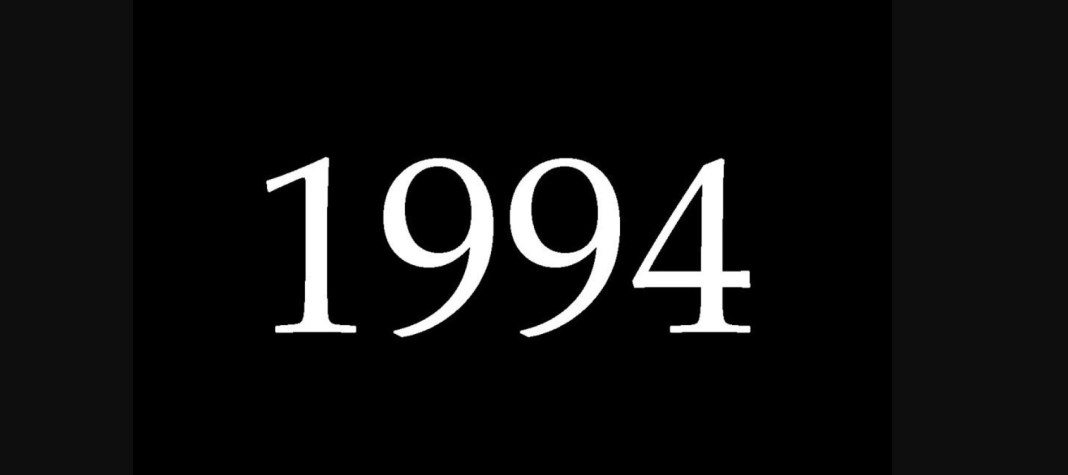Thanks to Wired for this:
In 1994, everything was cool.
Music, movies, TV—the cultural output felt alive. People were also very cool, or they were achieving cool by trying not to be. Anyway, 30 years ago I was not cool and didn’t have much to do on Friday nights. That’s why, on April 8, 1994, I was home, watching as Kurt Loder took over MTV to inform me, and everyone, that Kurt Cobain was gone.
Reminiscing on the passing of Nirvana’s frontman might be a maudlin way to go about it, but it’s a wild reminder of just how many culture-shifting events took place in 1994. Natural Born Killers and Pulp Fiction. Nine Inch Nails released The Downward Spiral a month before Cobain committed suicide. Tori Amos dropped Under the Pink a few weeks before that. Above the Rim hit theaters that spring, and lived in car speakers through the summer since Warren G and Nate Dogg’s “Regulate” was on the soundtrack. Aaliyah released “Back & Forth”; Brandy wanted to be down; TLC chased “Waterfalls.” My So-Called Life premiered its one perfect, ill-fated season. Jim Carrey had three films in theaters, of varying quality: Dumb and Dumber, Ace Ventura: Pet Detective, and The Mask. Brad Pitt had three—two that matter: Legends of the Fall and Interview With the Vampire. Kevin Smith’s debut, Clerks, premiered at Sundance, got picked up by Harvey Weinstein’s Miramax, and was a cult hit before the year was out.
These things were all anyone could talk about, culturally. That’s all there was to talk about.
Except they weren’t. Above are just a few of the cultural moments that made nationwide, and worldwide, attention in 1994. It’s the stuff that hit the suburbs. Some of the year’s best art was slow-burn. As C. Brandon Ogbunu and Lupe Fiasco pointed out in their essay last week commemorating the 30th anniversary of Nas’ Illmatic, “the early ’90s had no hip-hop message boards. There was no social media. The legend of Illmatic was built from street corner to street corner, person to person, party to party.” Even still, Nas was on Yo! MTV Raps.
Every so often some pundit emerges to scratch a chin and pontificate about whether or not monoculture is dead. The New York Times wonders if these are “post-water-cooler TV” times; Vox asks “Can monoculture survive the algorithm?” My colleague Kate Knibbs has already written about how lamenting the demise of the monoculture is all a bit ludicrous, and while it’s arguable there’s just more culture now—more TikToks, more Instagram videos reeling out of Coachella, more streaming shows—there are still common denominators: Beyoncé, Taylor Swift, hating Zack Snyder movies. Monoculture, I’d argue, never died; rather, it’s a zombie haunting everything. The ghost in the machine is an unspoken desire to share something collectively, even if only to tear it apart together. (See again: Taylor Swift.)
Look around: Civil War, which just spent its second week at the top of the box office, stars none other than Kirsten Dunst, whose career kicked off with Interview With the Vampire. (Season 2 of AMC’s new adaptation of the Anne Rice book that movie was based on premieres in May.) If anything unseats Civil War this weekend, it’ll be director Luca Guadagnino’s Challengers, the horny tennis movie scored by Nine Inch Nails’ Trent Reznor and Atticus Ross. (If Orbital, Pretty Hate Machine, and Darude’s “Sandstorm” ever had a three-way, this would be the score. That’s a compliment.)
A remake of The Crow, which also came out in 1994 and also featured Nine Inch Nails, is coming in August. Last week Quentin Tarantino sources revealed he wouldn’t be making his next highly anticipated movie, and people had big feelings about it. Swedish group Rednex’s “Cotton Eye Joe,” released in August of 1994, has taken over TikTok via meme; it’s amassing ungodly view counts on YouTube.
Pick any year, any set of anniversaries, and this will happen. Nostalgia cycles work this way, and as Reznor himself told GQ recently, “one has to look forward.” Which is to say 1994 isn’t special; it’s just easy to look back on and marvel at. And mourn.
But there is one thing that sets 1994 apart: It might be the last calendar year not really captured online. Netscape Navigator, what would become many people’s default browser, launched December 15, 1994. America Online wouldn’t hit a million users until 1995. The age where nearly all culture would get consumed—and critiqued—on the internet was still in the distance. My memories of 1994 exist as they are; no one can go back and look at tweets, IG stories, or Facebook posts to watch their friend’s Ace Ventura impression or to recall how people reacted when Cobain died.
Hip-hop message boards, X-Files fan forums—these things were coming, but not yet. If you heard about Woodstock ’94 that year, it was on MTV or in Rolling Stone. Not TikTok. Not even Myspace. Pulp Fiction wouldn’t get memed for another decade or so. Social media takes heat for breaking up monoculture, but it also helps solidify it. Maybe if it had arrived earlier, it could have saved My So-Called Life.
